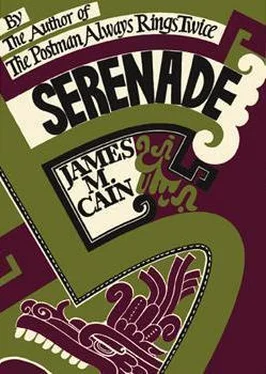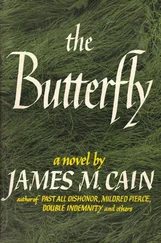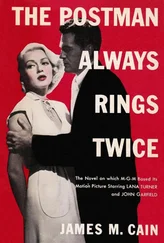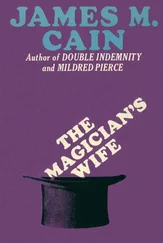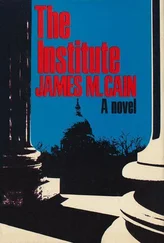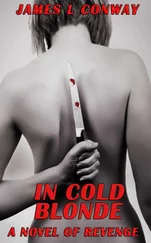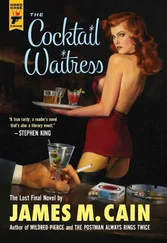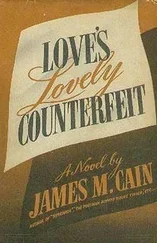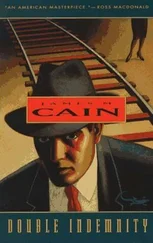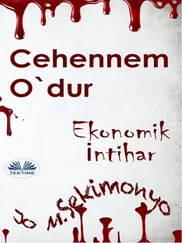“I get it.”
He kept walking around his office, then he picked up the paper and studied that a while, then walked around some more. “There’s something I want to warn you about.”
“Yeah. What?”
“It seemed to me I got you out very easily.”
“I didn’t do anything.”
“If they had wanted to hold you, there were two or three charges, apparently, they could have brought against you. All bailable offenses, but they could have kept you there quite a while. They could have made trouble. Also, the bond was absurdly low.”
“I don’t quite follow you.”
“They haven’t got her. They may have her, tucked away in some station-house in the Bronx, they may be holding her there and saying nothing for fear of habeas corpus proceedings, but I don’t think so. They haven’t got her, and it’s quite possible they’ve let you out so they can locate her through you.”
“Oh, now I see what you mean.”
“You going back to your apartment?”
“I don’t know. I suppose so.”
“... You’ll be watched. There’ll probably be a tail on you day and night. Your phone may be tapped.”
“Can they do that?”
“They can, and they do. There may be a dictaphone in there by now, and they’re pretty good at thinking of places to put it without your finding it, or suspecting it. It’s a big apartment house, and that makes it all the easier for them. I don’t know what her plans are, and apparently you don’t. But it’s a bad case. If they catch her, I’ll do everything I can for her, but I warn you it’s a bad case. It’s much better than she not be located... Be careful.”
“I will.”
“The big danger is that she phone you. Whatever you do, the second she rings up, warn her that she’s being overheard.”
“I’ll remember that.”
“You’re being used as a decoy.”
“I’ll watch my step.”
When I got up to Twenty-second Street a flock of reporters were there, and I stuck with them for about ten minutes. I thought it was better to answer their questions some kind of way, and get rid of them, than have them trying to get to me all day. When I got up to the apartment the phone was ringing, and a newspaper was on the line, offering me five thousand dollars for a signed story of what I knew about it, and about her, and I said no, and hung up. It started to ring again, and I flashed the board and told them not to put through any more incoming calls, or let anybody up. The door buzzer sounded. I answered, and it was Harry and Tony, on hand to tell me what they knew. I peeled off a hundred-dollar bill as they started to talk, handed it over, and then remembered about the dictaphone. We went out in the hall, and they whispered it. She didn’t leave right after it happened. She went to the apartment, packed, and changed her dress, and about five or ten minutes later buzzed twice, like I had told her to. Tony had the car up there all that time, waiting for her, and he opened, pulled her in, and dropped her down to the basement. They went out by the alley, and when they came out on Twenty-third Street he got her a cab, and she left. That was the last he saw of her, and he didn’t tell it to the police. While he was doing that, Harry was on the board in the lobby, and didn’t pay much attention when he saw the fags going out, and neither did the guy from the Immigration Service. How the cops found it out they didn’t know, but they thought the fags must have bumped into one outside, or got scared and thought they better tell it anyway, or something. Tony said the cops were already in Winston’s apartment before she left.
They went down and I went in the apartment again. With the phone cut off it was quiet enough now, but I began looking for the dictaphone. I couldn’t find anything. I looked out the window to see if anybody was watching the building. There wasn’t anybody out there. I began to think Sholto was imagining things.
Around two o’clock I got hungry and went out. The reporters were still down there, and almost mobbed me, but I jumped in a cab and told him to drive to Radio City. As soon as he got to Fourth Avenue I had him cut over to Second again, and come down, and got out at a restaurant around Twenty-third Street. I had something to eat and took down the number of the pay phone. When I got back to the apartment house, I whispered to the boy on the board if a Mr. Kugler called, to put him through. I went upstairs and called the restaurant phone. “Is Mr. Kugler there?”
“Hold the line, I’ll see.”
I held the line, and in a minute he was back. “No Mr. Kugler here now.”
“When he comes in ask him to call Mr. Sharp. S-H-A-R-P.”
“Yes sir, I’ll tell him.”
I hung up. In about twenty minutes the phone rang. “Mr. Sharp? This is Kugler.”
“Oh, hello, Mr. Kugler. About those opera passes I promised you, I’m afraid I’ll have to disappoint you for the time being. You may have read in the paper I’m having a little trouble now. Can you let me put that off till next week.”
“Oh, all right, Mr. Sharp. Any time you say.”
“Terribly sorry, Mr. Kugler.”
I hung up. I knew then that Sholto knew what he was talking about. I didn’t know any Mr. Kugler.
Harry kept bringing up new editions as they came out, and the stuff that was coming in for me. They still hadn’t got her. They found the taxi driver that rode her from Twenty-third Street. He said he took her down to Battery Park, she paid him with a five-dollar bill, so he had to go in the subway to get change, and then went off, carrying the valise. He told how Tony had flagged him, and Tony took another trip down to headquarters. It said the cops were considering the possibility she had jumped in the river, and that it might be dragged. The stuff that was coming in was a flock of telegrams, letters, and cards from every kind of nut you ever heard of, and opera fan, and shyster lawyer. But a couple of those wires weren’t from nuts. One was from Panamier, saying the broadcast would temporarily be carried on by somebody else. And one was from Luther, saying no doubt I preferred not to have any more opera appearances until I got my affairs straightened out. The last afternoon edition had a story about Pudinsky. I felt my mouth go cold. He was the one person that might know about Winston and me. If he did he didn’t say anything. He said what a fine guy Winston was, what a loyal friend, and defended him for calling up the Immigration people. He said Winston only had my best interests at heart.
I went out to eat around seven o’clock, dodged the reporters again, and had a steak in a place off Broadway. My picture was in every paper in town, but nobody seemed to notice me. One reason was, most of those pictures had been taken while I was in Hollywood, and I had put on a lot of weight since then. I wasn’t exactly fat when I arrived from Mexico. Then I had a little trouble with my eyes, and had got glasses. I ate what I could, walked around a little, then around nine o’clock came back to the apartment: All the time I was walking I kept looking back, to see if I was followed. I tried not to, but I couldn’t help it. In the cab, I kept twisting around, to see what was back of us.
There was another mountain of stuff when I came in, but I didn’t bother to open it. I read back all the newspaper stuff again, and then there didn’t seem to be anything to do but to go to bed. I lay there, first trying to think and then trying to sleep. I couldn’t do either one. Then after a while I did drop off. I woke up in a cold sweat with moans coming out of my mouth. The whole day had been like some kind of a fever dream, chasing in and out of cabs, dodging reporters, trying to shake the police, if they were around, reading papers. Now for the first time I seemed to get it through my head the spot we were in. She was wanted for murder, and if they caught her they would burn her in the chair.
Читать дальше
